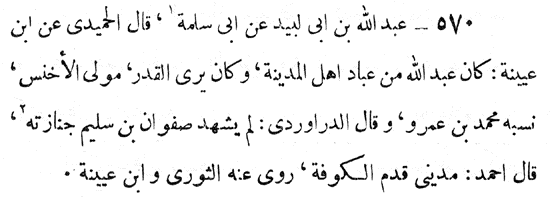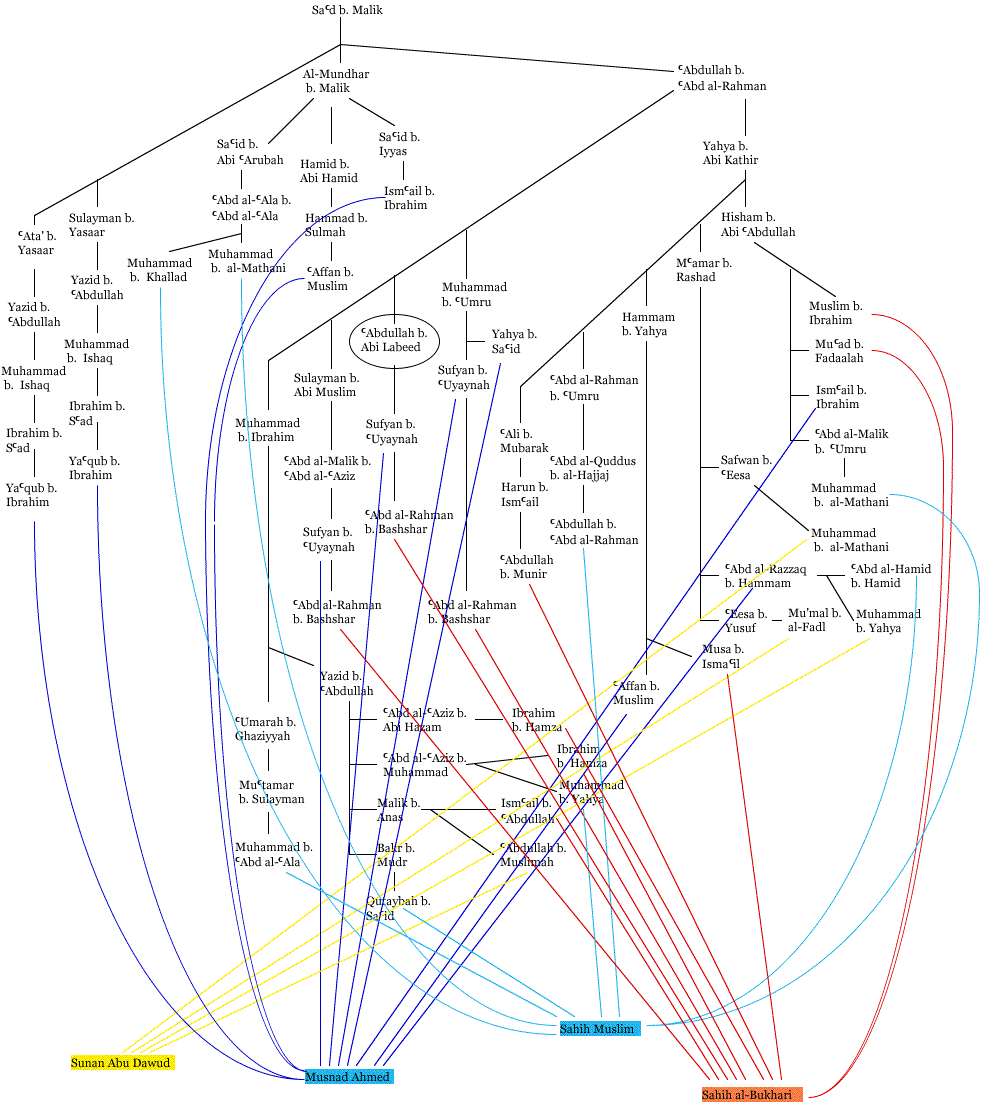![]()
Islamic Awareness
© Islamic Awareness, All Rights Reserved.
First Created: 5th August 2000
Last Modified: 7th September 2003
The next person on the list is:
It is interesting to note that Bukhari wrote a book about the narrators (Zuafa-us-sagher). What is even more interesting is that Bukhari's book condemns several narrators including: ... Abdullah bin Abi Labeed ... as unreliable. However, the Hadith-collection of Bukhari in the its modern form actually includes many traditions narrated by these very individuals! Obviously, these traditions, which Bukhari rejected, were inserted in his book following his death.
a narrator called "Abdullah bin Abi Labeed".
1. Did Al-Bukhari Say Abdullah B. Abi Labeed "Unreliable"?Fortunately for the missionaries, Abdullah bin Abi Labeed is in Kitab al-Du`afa al-Saghir where al-Bukhari says that he is accused of being a Qadari. Unfortunately for them, al-Bukhari does not say that Abdullah bin Abi Labeed is "unreliable".

189 - `Abdullah Ibn Abi Labid al-Madani: from Abu Salamah.
Muhammad told us, al-Humaydi narrated to us that Ibn `Uyaynah said: `Abdullah was one of the biggest worshippers in Madinah and was accused of being a qadari. He is the freed slave of al-Akhnas. Muhammad Ibn `Amr drove his genealogy [??]. Al-Darawardi said: "Safwan Ibn Sulaym did not attend his funerals", which is possible.[1]
In the footnotes we read:

189 - He is called Abu al-Mughirah. Ibn Ma`in deemed him thiqah [i.e., trustworthy] and al-`Aqili said: He differs in some of his hadith. Ibn `Udayy said: In the field of narration, he is alright. [refer to al-Mizan 475/2 and al-Kabir 182/5][2]
Al-Bukhari elaborates in his Kitab al-Tarikh al-Kabir:

570 - `Abdullah Ibn Abi Labid from Abu Salamah. Al-Humaydi narrated to us that Ibn `Uyaynah said: `Abdullah was one of the biggest worshippers in Madinah. He believed in predestination [Arabic: qadar]. He is the freed slave of al-Akhnas. Muhammad Ibn `Amr drove his genealogy [??]. Al-Darawardi said: "Safwan Ibn Sulaym did not attend his funerals". Ahmad said: He is from Madinah and came to Kufah; narrated from him al-Thawri and Ibn `Uyaynah.[3]
Ibn Hajar in his Taqrib al-Tahdhib said:

570 - `Abdullah Ibn Abi Labid: with an "a" after the L. He is from Madinah and [is also called] Abu al-Mughirah. He moved to Kufah. He is deemed thiqah [i.e., trustworthy] but was accused of being a qadari...[4]
Al-`Ijli said:
thiqah....[5]
So he is a trustworthy narrator and the only criticism al-Bukhari mentions in Kitab al-Du`afa al-Saghir is that he is Qadari and there is no mention of him being "unreliable".
2. Traditions Of `Abdullah B. Abi Labid In The Sahih Of Al-BukhariAl-Bukhari records only a single hadith (as opposed to the claim of missionaries of "many traditions") from him in his Sahih about I`tikaaf.
Allah's Apostle used to practice I`tikaaf in the middle ten days of Ramadan and once he stayed in I`tikaaf till the night of the twenty-first and it was the night in the morning of which he used to come out of his I`tikaaf. The Prophet said, "Whoever was in Itikaf with me should stay in I`tikaaf for the last ten days, for I was informed (of the date) of the Night (of Qadr) but I have been caused to forget it. (In the dream) I saw myself prostrating in mud and water in the morning of that night. So, look for it in the last ten nights and in the odd ones of them." It rained that night and the roof of the mosque dribbled as it was made of leaf stalks of date-palms. I saw with my own eyes the mark of mud and water on the forehead of the Prophet (i.e. in the morning of the twenty-first). [Kitab al-I`tikaaf, No. 1899]
The isnad bundle looks something like this.

Ahmed, who died before al-Bukhari, also recorded the same hadith from `Abdullah and used isnads that are independent of `Abdullah. This is also true for al-Bukhari. It is hard to see how this hadith could have been "inserted" in al-Bukhari's Sahih when al-Bukhari himself has collected it from isnads independent of `Abdullah (who is neither depicted as "unreliable" nor his traditions "rejected!).
References
[1] Muhammad Ibn Isma`il al-Bukhari, Kitab al-Du`afa al-Saghir, 1976 (1396 H), Dar al-Wa`y, p. 66.
[2] ibid.
[3] Muhammad Ibn Isma`il al-Bukhari, Kitab al-Tarikh al-Kabir, 1986, Volume V, Mu'assasat al-Kutub al-Thaqafiyah: Beirut (Lebanon), p. 182.
[4] Ahmad Ibn `Ali Ibn Hajar al-`Asqalani, Taqrib al-Tahdhib, Volume I, 1960, Al-Maktabat al-`Ilmiyyah: Al-Madinah, p. 443.
[5] Ahmad Ibn `Abdullah Ibn Salih Abu al-Hassan al-`Ijli, Tarikh al-Thiqat, 1984 Edition, Dar al-Kutub al-`Ilmiyyah: Beirut (Lebanon), No. 872.